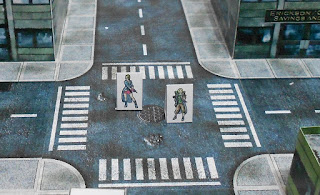Last weekend I spent some time reading and having fun with
The Traveller Book. Released in 1982, this classic Traveller compilation predates my first contact with RPGs by almost a decade. Having read about how inviting to solo play this system was, I got the PDF some time ago but I had not made anything with it yet. It is a scan of the printed book and some pages are a bit blurred but readable. So after skimming over the book I went on to perform some of the suggested "Basic Traveller Activities" (p.122) -- in this case, creating characters.
 |
| Starting with a blank slate, then adding some rolls to find out the character's fate. [source: The Traveller Book] |
My first character, with reasonable strength and dexterity and good intelligence and education scores died during his first term of service in the army. The title of this post is the "UPP notation" of the characteristics of my first
surviving character, who despite the low dexterity and intelligence scores, served two terms in the army to raise to the rank of captain. UPP (universal personality profile) notation lists the character's attributes (strength, dexterity, endurance, intelligence, education and social standing) as hexadecimal numbers.
Jake Maxwell, 52A347, age 26, Captain (Army)
Skills: Rifle-1, SMG-1, Gambling-1, Body Pistol-1, Dagger-1
Possessions: 10,000 Cr, High Passage
Afterwards I created two more characters:
Mark Sanders, 7877D4, age 26, served on the Navy
Skills: Blade-1, Vacc Suit-1
Possessions: 50,000 Cr
Julie Briggs, 735856, age 30, 4th Officer (Merchant)
Skills: Vacc Suit-2, Medical-1, Body Pistol-1, Electronics-1
Possessions: 80,000 Cr, Low Passage
Character creation assumes that characters start at the age of 18. The six attributes are rolled and then the character may attempt to enlist on one of six services (navy, army, marines, merchants, scouts and
other). Failure to enlist results in being drafted into a random service. After this, characters may serve one or more four-year terms, during which they might improve skills and training, go up in ranks and so on. They might also get killed in service. Provided this does not happen, at the end of a term of service the character may muster out, collect some benefits and go on to adventure.
 |
| "Mass Effect" anyone? [source: The Traveller Book, p.28] |
It is fun to see this "simulation" approach to character creation, something that other games would later adopt (Fuzion and Blue Planet come to mind.) While it is miles away from more recent story-driven role-playing game trends, it does provide a "game within the game" that may itself serve as a procedural source of other character stories.













